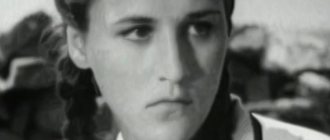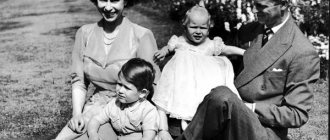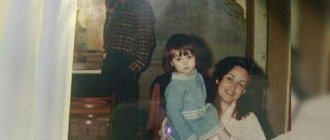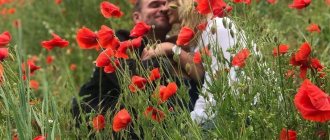Anna Andreevna Gorenko began publishing at the age of 22 - immediately under the name Akhmatova. The use of a pseudonym in itself was not just a common thing at that time, but generally a sign of good taste among novice authors. The second name was usually chosen under the influence of some life events or simply based on sonority. This is how “Akhmatova” appeared, with the accompanying legend. They say that the poetess is actually a distant descendant of that same Akhmat, the last khan of the Golden Horde.
This was unlikely to be true, but still a certain magic of the surname took over Anna Andreevna’s life thanks to her pseudonym. Like Akhmat, a stranger to Rus', she found herself a stranger in the Soviet Union, which took away her two spouses and son. Like a Mongol khan, she managed to withstand all the tests and live a decent life, giving Russian poetry hundreds of works considered classics.
On June 23, 2020, commemorative events are being held around the world in honor of the 130th anniversary of the birth of Anna Akhmatova. On the day of the poetess’s anniversary, MIR 24 decided to remember her tragic fate and difficult relationship with her homeland.
Anna Akhmatova's first husband
Anna met her first lover at the age of 14. It was the poet Nikolai Gumilyov, who was 17 years old at the time. The young man tried for a long time to woo the girl, but his marriage proposals were refused. Only in 1909 did Anna give her consent, and on April 25, 1910, the couple got married. After the event, the young couple left Paris for 6 months. It is interesting that none of the relatives came to the wedding. Many considered this marriage obviously doomed.
Nikolai Gumilyov and Anna Akhmatova lived in a marital relationship for 8 years. They had a son, Lev. Having received Anna as his wife, Nikolai quickly lost interest in her. He began to travel a lot and spend little time at home. In 1912, Akhmatova’s first collection of poems was published, but in the same year a son was born. The young man was not ready for the restriction of freedom. Therefore, Leo was taken in by his mother-in-law to be raised.
When the First World War began, Gumilyov went to the front. In 1915 he was wounded, Anna constantly visited him in the hospital. He was actively involved in creativity and was in no hurry to return to Russia. Therefore, his wife asked him for a divorce. The reason was marriage to Vladimir Shileiko.
Anna Andreevna Akhmatova - biography
Anna Akhmatova Biographies / Famous namesakes / Names / Surnames / Patronymics / First and patronymic / Horoscopes / Tests / Events / Home
We are all a little bit of a guest in life. Life is just a habit
Anna Andreevna Akhmatova (pseudonym, real name Gorenko) is a Russian[en] poetess, translator and literary critic, one of the most significant figures in Russian literature of the 20th century. Zodiac sign - Cancer.
Akhmatova adhered to Acmeism (collections “Evening”, 1912, “Rosary”, 1914). Loyalty to the moral foundations of existence, the psychology of female feelings, comprehension of the national tragedies of the 20th century, coupled with personal experiences, attraction to the classical style of poetic language in the collection “The Running of Time. Poems. 1909-1965".
Autobiographical cycle of poems “Requiem” (1935-1940; published 1987) about the victims of repression of the 1930s. In "Poem without a Hero" (1940-1965, was published in full in 1976) - a recreation of the era of the "Silver Age". Articles about the Russian poet Alexander Sergeevich Pushkin.
Family. Childhood. Studies
Anna Akhmatova was born
June 23 (June 11, old style) 1889 in Bolshoy Fontan, near Odessa. Her ancestors on her mother’s side, according to family legend, went back to the Tatar Khan Akhmat (hence the pseudonym). His father was a mechanical engineer in the navy and occasionally dabbled in journalism. As a child, Akhmatova lived in Tsarskoe Selo, where in 1903 she met Nikolai Stepanovich Gumilyov and became a regular recipient of his poems. In 1905, after her parents’ divorce, she moved to Evpatoria. In 1906-1907, Anna Andreevna studied at the Fundukleevskaya gymnasium in Kyiv, in 1908-1910 - at the law department of the Kyiv Higher Women's Courses. Then she attended N.P. Raev’s women’s historical and literary courses in St. Petersburg (early 1910s).
Gumilev
| Anna Akhmatova and Nikolai Gumilev with their little son - the future famous historian L. N. Gumilev. 1915 |
In the spring of 1910, after several refusals, Anna Akhmatova agreed to become Gumilyov’s wife (they got married on May 8, 1910; in 1910-1916 she lived with him in Tsarskoye Selo, and for the summer she went to the Gumilevs’ estate Slepnevo, in the Tver province); On her honeymoon she made her first trip abroad, to Paris (she visited there again in the spring of 1911), met Amedeo Modigliani, who made pencil portrait sketches of her.
On April 25, 1910, the wedding of Anna Akhmatova and Nikolai Gumilyov took place. Amanda Haight, a memoirist, wrote from Akhmatova’s words: “Akhmatova’s relatives considered the marriage obviously doomed to failure, and none of them came to the wedding, which deeply offended her.”
In the spring of 1912, the Gumilevs traveled around Italy. On October 14 (October 1, O.S.), 1912, their son Lev (Lev Nikolaevich Gumilyov) was born. In 1918, having divorced Gumilev (the marriage actually broke up in 1914), Akhmatova married Assyriologist and poet Vladimir Kazimirovich Shileiko (real name Voldemar).
Anna Akhmatova's first publications. First collections. Success
Writing poetry from the age of 11 and publishing from the age of 18 (the first publication was in the Sirius magazine published by Gumilev in Paris, 1907), Akhmatova first announced her experiments to an authoritative audience (Vyacheslav Ivanov, M.A. Kuzmin) in the summer of 1910. Defending with from the very beginning of her family life, spiritual independence, Anna made an attempt to get published without the help of Gumilyov - in the fall of 1910 she sent poems to “Russian Thought” to Valery Yakovlevich Bryusov, asking whether she should study poetry, then she submitted poems to the magazines “Gaudeamus”, “General Journal”, "Apollo", which, unlike Bryusov, published them.
Upon Gumilyov’s return from an African trip (March 1911), Akhmatova read to him everything he had written over the winter and for the first time received full approval for her literary experiments. From that time on, she became a professional writer. Her collection “Evening” (with parting words from Kuzmin), released a year later, gained very early success. Also in 1912, participants in the newly formed “Workshop of Poets” (Akhmatova was elected its secretary) announced the emergence of the poetic school of Acmeism.
Under the sign of growing metropolitan fame, Akhmatova’s life passed in 1913: Anna spoke to a crowded audience at the Higher Women’s (Bestuzhev) Courses, her portraits were painted by artists, poets (including Alexander Alexandrovich Blok) addressed her with poetic messages, which gave rise to the legend of their secret novel). New, more or less long-lasting intimate attachments of Akhmatova arose - to the poet and critic N.V. Nedobrovo, to the composer A.S. Lurie and others.
In 1914, Anna Akhmatova’s second collection, “The Rosary,” was published (reprinted about 10 times), which brought her all-Russian fame, spawned numerous imitations, and established the concept of “Akhmatova’s line” in the literary consciousness. In the summer of 1914, Akhmatova wrote the poem “Near the Sea,” which goes back to her childhood experiences during summer trips to Chersonesus near Sevastopol.
"White Flock"
With the outbreak of the First World War, Anna Akhmatova sharply limited her public life. At this time, she suffered from tuberculosis, a disease[en] that did not let her go for a long time. In-depth reading of the classics (A.S. Pushkin, Evgeniy Abramovich Baratynsky, Jean Racine, etc.) affects her poetic manner, the acutely paradoxical style of quick psychological sketches gives way to neoclassical solemn intonations. Insightful criticism discerns in her collection “The White Flock” (1917) a growing “sense of personal life as a national, historical life” (Boris Mikhailovich Eikhenbaum).
Inspiring an aura of autobiographical context in her early poems, Anna Andrevna introduced free “self-expression” as a stylistic principle into high poetry. The apparent fragmentation, disorganization, spontaneity of lyrical experience is more and more clearly subordinated to a strong integrating principle, which gave Vladimir Vladimirovich Mayakovsky a reason to note: “Akhmatova’s poems are monolithic and will withstand the pressure of any voice without cracking.”
Post-revolutionary years
The first post-revolutionary years in Anna Akhmatova’s life were marked by hardships and complete separation from the literary environment, but in the fall of 1921, after the death of Blok and the execution of Gumilev, she, having parted ways with Shileiko, returned to active work - participated in literary evenings, in the work of writers’ organizations, published in periodicals. In the same year, two of her collections were published - “Plantain” and “Anno Domini. MCMXXI". In 1922, for a decade and a half, Akhmatova united her fate with art critic Nikolai Nikolaevich Punin (Life years 1888-1953. Since 1918, one of the organizers of the system of art education and museum affairs in the USSR[en]. Works on the history of Russian art, on the work of contemporary artists. Repressed; rehabilitated posthumously).
Years of silence. "Requiem"
In 1924, Akhmatova’s new poems were published for the last time before a multi-year break, after which an unspoken ban was imposed on her name. Only translations appeared in print (letters from Peter Paul Rubens, Armenian poetry), as well as an article about Pushkin’s “The Tale of the Golden Cockerel.” In 1935, her son L. Gumilyov and Punin were arrested, but after Akhmatova’s written appeal to Stalin they were released. In 1937, the NKVD prepared materials to accuse her of counter-revolutionary activities; in 1938, Anna Andreevna’s son was arrested again.
The experiences of these painful years, expressed in poetry, made up the “Requiem” cycle, which the poetess did not dare to record on paper for two decades. In 1939, after a semi-interested remark from Stalin, publishing authorities offered Anna a number of publications. Her collection “From Six Books” (1940) was published, which included, along with old poems that had passed strict censorship selection, new works that arose after many years of silence. Soon, however, the collection was subjected to ideological criticism and removed from libraries.
War. Evacuation
In the first months of the Great Patriotic War, Anna Akhmatova wrote poster poems (later “Oath”, 1941, and “Courage”, 1942 became popularly known). By order of the authorities, she was evacuated from Leningrad before the first winter of the siege; she spent two and a half years in Tashkent. She wrote many poems and worked on “Poem without a Hero” (1940-1965), a baroque-complicated epic about the St. Petersburg 1910s.
Resolution of the Central Committee of the All-Union Communist Party of Bolsheviks of 1946
In 1945-1946, Anna Andreevna incurred the wrath of Stalin, who learned about the visit of the English historian Isaiah Berlin to her. The Kremlin authorities made her, along with Mikhail Mikhailovich Zoshchenko, the main object of party criticism; the resolution of the Central Committee of the All-Union Communist Party of Bolsheviks, “On the magazines “Zvezda” and “Leningrad” (1946), directed against them, tightened the ideological dictate and control over the Soviet intelligentsia, misled by the emancipating spirit national unity during the war[en].
There was a publication ban again; an exception was made in 1950, when Akhmatova imitated loyal feelings in her poems written for Stalin's anniversary in a desperate attempt to soften the fate of her son, who was once again imprisoned.
Last years of life. "Running of Time"
In the last decade of A. Akhmatova’s life, her poems gradually, overcoming the resistance of party bureaucrats and the timidity of editors, came to a new generation of readers[en]. In 1965, the final collection “The Running of Time” was published. In her dying days, she was allowed to accept the Italian Etna-Taormina Literary Prize (1964) and an honorary doctorate from Oxford University (1965).
The very fact of Anna Akhmatova’s existence was a defining moment in the spiritual life of many people, and her death meant the severance of the last living connection with a bygone era. (R. D. Timenchik)
On December 15, 1964, Oxford University decided to award Anna Andreevna Akhmatova a degree and an honorary doctorate of literature.
More:
Anna Akhmatova said to herself that she was born on the night of June 23-24, “on the night of Ivan Kupala, on a mysterious, witchcraft night, when the fern blooms, spells work and spells are lifted.” It was the end of the 19th century, 1889.
…
There are just poets, there are talented poets, there are genius poets, there are graphomaniacs, and she is a queen. “Akhmatova is perfection, this is her dignity and misfortune,” another famous poetess, Marina Tsvetaeva, will say about her. This is some other dimension, outside the general scale, above it.
“At that time I was visiting the earth[en]. I was given a name at baptism - Anna, the sweetest for human lips and ears.
…
Anna Akhmatova’s relationship with Nikolai Gumilev was complex and confusing. The two poets undoubtedly had a huge influence on each other, both were “witchcraft children”, with a keen gift of premonition. Literary scholars are still arguing whether Anna loved Gumilev or not, they recall her refusals, his suicide attempts, but one phrase from Anna’s letter seems very significant to me: “Gumilev is my Destiny, and I humbly surrender to it.”
They merried. Gumilyov introduced his wife to the literary and poetic circles in which he himself moved. Friends jokingly called them “GumiLION and GumiLIONE” - emphasizing the pride, nobility and specialness of this couple. But two poets, two geniuses in one house, it’s like two huge birds in flight - they could be closer, but then they won’t be able to fly - they will fall. Nikolai’s non-recognition of Anna’s gift obviously played an important role in the breakup; she will remember this more than once with resentment:
“He talked about summer and that it is absurd for a woman to be a poet.”
The bitterness of separation will be reflected in many of her poems:
“Oh, I know: his joy is to know intensely and passionately, That he doesn’t need anything, That I have nothing to deny him.”
But the real, terrible, forever separation came later and, anticipating it, Anna would write:
“We thought: we are beggars, we have nothing, And as we began to lose one after another, So that every day became a day of remembrance, We began to compose songs About the great mercy of God and about our former wealth.”
The romance of Anna Akhmatova and Nikolai Gumilyov was more like a game of cat and mouse than a relationship between two loving people. He is a poet with a complex inner world, adoring Oscar Wilde and prone to excessive theatricality. She is a poetess, freedom-loving, impulsive and changeable. He sought her hand for several years and tried to commit suicide when she once again refused him. This union became sacred for both, but they realized it too late.
…
In 1912, Anna Akhmatova’s first collection of poems, “Evening,” was published in a small edition of 300 copies. Critics responded well to this collection, which pleased and surprised the poet. Then there were other collections, much larger circulations and fame.
Serious and profound criticism, especially the article by Korney Ivanovich Chukovsky “Akhmatova and Mayakovsky,” which compared the two poets, bore bitter fruits in 1925 - the Central Committee issued a resolution to remove Anna Akhmatova’s books from circulation. She became a banned poet. Anna Akhmatova took up literary studies - she wrote articles about various poets, but most of all about Gumilyov, who was already executed. And later - about Pushkin. The study of Pushkin’s work and biography fascinated Anna Akhmatova so much that it became her favorite thing. And poetry, poems were banned.
She was called the best poet of the Silver Age, but Anna was against it - she lived and worked not only in the Silver Age! She worked and lived, but she was not published.
In 1935, Anna’s son, Lev Gumilyov, was arrested, but soon, after her letter to Stalin, he was released, and in 1938 he was arrested again.
“Husband in the grave, son in prison, Pray for me”...
And “Requiem” appeared - a poem that Anna remembered by heart - she was afraid to write it down. This is a completely different Akhmatova, who survived terrible years and troubles... These are completely different poems - not prophetic, experienced. The crown turned into a crown of thorns, but did not fall from her head.
Requiem
No, and not under an alien firmament, And not under the protection of alien wings, - I was then with my people, Where my people, unfortunately, were. 1961
Instead of a preface
During the terrible years of the Yezhovshchina, I spent seventeen months in prison lines in Leningrad. One day someone “identified” me. Then the woman standing behind me, who, of course, had never heard my name, woke up from the stupor that is characteristic of us all and asked me in my ear (everyone there spoke in a whisper):
- Can you describe this?
And I said:
- Can.
Then something like a smile crossed what had once been her face.
April 1, 1957, Leningrad
…
Her fate was tragic. Three people close to her were subjected to repression: her first husband, Nikolai Gumilyov, was shot in 1921; the third husband, Nikolai Punin, was arrested three times and died in a camp in 1953; the only son, Lev Gumilyov, spent more than 10 years in prison in the 1930s-1940s and in the 1940s-1950s. The grief of the wives and mothers of “enemies of the people” was reflected in one of Akhmatova’s most significant works, the poem “Requiem.”
Recognized as a classic of Russian poetry back in the 1920s, Akhmatova was subjected to silence, censorship and persecution (including the 1946 resolution of the Central Committee of the All-Union Communist Party of Bolsheviks, which was not repealed during her lifetime); many works were not published in her homeland not only during the author’s lifetime, but and for more than two decades after her death. At the same time, Akhmatova’s name, even during her lifetime, was surrounded by fame among poetry admirers both in the USSR and in exile.
Anna Andreevna Akhmatova died
March 5, 1966 in Domodedovo, near Moscow. She was buried at the Komarovskoye cemetery near Leningrad.
On November 7, 2000 in Moscow, on Bolshaya Ordynka, a monument to Akhmatova was erected. A drawing by the poetess’s friend, the Italian artist Modigliani, was chosen as the basis for the monument.
- See other great women of history named Anna.
- Famous women named starting with the letter A (and men).
- Biographies of outstanding personalities of history with surnames starting with the letter A.
- The secret of the name Anna.
- Description of the first name and patronymic Anna Andreevna.
- Description of the patronymic Andreevna (and more).
- Description of female names starting with the letter A (and male names).
- Description of female first names and patronymics starting with the letter A (and male ones).
- Descriptions of female patronymics (and male ones).
- 100 most common Russian surnames.
- 250 all-Russian surnames.
- 100 most common surnames in the USA[en].
- And the definition of the letters of the name in the interpretation of a Russian astrologerAstrology
(from the Greek astron - star and logos - word, doctrine) - the doctrine of the influence of celestial bodies on the earthly world and man (his temperament, character, actions and future), which was determined through visible movements on the celestial sphere and the relative position of the luminaries (constellation) at a given moment in time (see Horoscope).Astrology arose in ancient times (Babylonian temple astrology and others), and was closely connected with astral cults and astral mythology. It became widespread in the Roman Empire (the first horoscopes were at the turn of the 2nd-1st centuries BC). Christianity criticized astrology as a type of pagan fatalism. Arabic astrology, which reached significant development in the 9th-10th centuries, penetrated into Europe from the 12th century, where astrology enjoyed influence until the mid-17th century and was then supplanted with the spread of the natural science picture of the world.
A revival of interest in astrology occurred after the 1st World War; the phenomena of astrology are associated with subtle cosmic and biocosmic rhythms, etc. Since the mid-20th century, astrology has regained popularity.
Felix Kazimirovich Velichko.
Did you like the article? Like, comment, share with friends! Get +1 to Karma And leave a comment just below. |
| Follow us: |
Find something else interesting:
Have something to say, add, or noticed a mistake? Share! Someday your children[en]-grandchildren will come here and see a familiar name...
Spam, insults, bad language, SEO links, advertising, disrespectful treatment, etc. prohibited. Violators are banned
.
By clicking the “Submit” button in the comment, I agree to the processing of personal data:
Thanks for the tip Privacy Policy | Home | Connection
Second marriage of Anna Akhmatova
Vladimir Shileiko - Soviet orientalist, poet, Assyriologist. There were rumors that he remained innocent until his marriage to Anna Akhmatova. The acquaintance began with the poem “Muse,” which the young man dedicated to the girl before 1913. A correspondence began between the young people. This led Anna to work on a new cycle of poems called “Black Dream”. She tried to formulate her attitude towards her lover in the work “You are always mysterious and new.”
Immediately after her divorce from Gumilyov, Anna marries Shileiko (1918). For some time the couple lived in the Sheremetyev Palace in Vladimir’s room. A little later, the family moved to the Marble Palace, where mainly RAIMK employees lived. The two-room apartment seemed like a luxury apartment. By this time, Anna had taken her son, who began to live with a new family.
Anna noted the difficult character of her husband. He did not miss the opportunity to make fun of his wife, noting her weaknesses in knowledge of foreign languages. A little later, the poetess admits that she did not leave Vladimir because she saw his madness. As soon as she realized that he could cope without her, she immediately left. The composer Arthur Lurie helped her make a choice, who found Anna a job in the library. After the divorce, Anna lived in the same apartment with Shileiko until mid-1922, maintaining friendly relations with him.
Childhood and youth, family
In Odessa, on June 11, 1889, a daughter, Anna, was born into the family of the hereditary nobleman Andrei Antonovich Gorenko. At that time, her father worked as an engineer-mechanic in the navy, and her mother Inna Stogova, whose family went back to the Horde Khan Akhmat, was also related to the poetess Anna Bunina. By the way, the poetess herself took her creative pseudonym – Akhmatova – from her ancestors.
It is known that when Anya was barely a year old, the whole family moved to Tsarskoye Selo. Now those places where Pushkin had previously worked had become firmly entrenched in her life, and in the summer she went to visit relatives near Sevastopol.
At the age of 16, the fate of the future poetess changes dramatically. Her mother, after divorcing her husband, takes the girl and goes to live in Evpatoria. This event took place in 1805, but they did not live there for long and again moved again, but this time to Kyiv.
Anya was an inquisitive child, so her education began early. Even before school, I not only learned to read and write using Tolstoy’s ABC, but also French, listening to the teacher who came to teach the older children. But classes at the Tsarskoye Selo gymnasium were difficult for the future poetess, although the girl tried very hard. But over time, Anna’s problems with her studies eventually subsided.
In Kyiv, where she and her mother moved, the girl enters the Fundukleevskaya gymnasium. As soon as she completed her studies, Anna entered the Higher Women's Courses, and then the Faculty of Law. But all this time her main occupation and interest is poetry.
Third husband
The third lover was art critic Nikolai Punin. The relationship with him lasted 16 years. After breaking up with Anna, Nikolai would have been arrested. He died while imprisoned in Vorkuta. The poetess did not like to remember the time spent in this relationship. During this period, she practically did not write poetry and lived in very cramped conditions.
Nikolai and Anna studied at the Tsarskoye Selo Lyceum. The young man knew Akhmatova’s first husband and attended a circle of writers organized by him. The first meeting with his future wife took place in 1914. She made a huge impression on the young man. It was only in 1921, when Anna separated from her second husband, that Nikolai was noticed. In 1923, Akhmatova moved to live with a young man. However, at that time he was still in an official relationship with Anna Arens, so the poetess lived in his 4-room apartment along with Nikolai’s official wife.
Such uncertainty did not suit the art critic, since he had to support several families. Akhmatova first decided to part with Punin in 1930. She didn’t do this because her common-law husband promised to commit suicide. In 1938, the couple broke up, although they continued to live in the same apartment.
Already in 1937, Anna began a friendship with Vladimir Garshin, which after 1938 grew into a new love. They lived only a short time, and the man himself initiated the breakup. According to him, the reason for the separation was Garshin’s visions. The deceased wife came to them, who warned against marrying Akhmatova.
Break with Gumilyov and revolution
In March, Anna Andreevna accompanied Nikolai Gumilyov abroad, where he served in the Russian Expeditionary Force. And already in the next 1918, when he returned from London, a break occurred between the spouses. In the autumn of the same year, Akhmatova married V.K. Shileiko, an Assyrian scientist and translator of cuneiform texts.
The poetess did not accept the October Revolution. For, as she wrote, “everything was plundered and sold; everything has been devoured by hungry melancholy.” But she did not leave Russia, rejecting the “comforting” voices calling her to a foreign land, where many of her contemporaries found themselves. Even after the Bolsheviks shot her ex-husband Nikolai Gumilev in 1921.
December 1922 was marked by a new turn in Akhmatova’s personal life. She moved in with art critic Nikolai Punin, who later became her third husband.
The beginning of the 1920s was marked by a new poetic rise for Akhmatova - the release of the poetry collections Anno Domini and Plantain, which secured her fame as an outstanding Russian poetess. During these same years, she seriously studied the life and work of Pushkin. The result of these studies were the following works: “About the Golden Cockerel”, “The Stone Guest”, “Alexandrina”, “Pushkin and the Nevskoe Seaside”, “Pushkin in 1828”.
New poems by Akhmatova were no longer published in the mid-1920s. Her poetic voice fell silent until 1940. Hard times have come for Anna Andreevna. In the early 1930s, her son Lev Gumilyov was repressed; he survived three arrests during the period of repression and spent 14 years in camps. All these years, Anna Andreevna patiently worked for the release of her son, just as she worked for her friend, the poet Osip Mandelstam, who was arrested at the same time. But if Lev Gumilyov was subsequently rehabilitated, then Mandelstam died in 1938 in a transit camp on the way to Kolyma. Later, Akhmatova dedicated her great and bitter poem “Requiem” to the fate of thousands and thousands of prisoners and their unfortunate families.
In the year of Stalin’s death, when the horror of repression began to recede, the poetess uttered a prophetic phrase: “Now the prisoners will return, and the two Russias will look into each other’s eyes: the one that imprisoned, and the one that was imprisoned. A new era has begun."
Interesting facts from the life of Akhmatova
- Throughout her adult life, Akhmatova kept a diary, excerpts from which were published in 1973. On the eve of her death, going to bed, the poetess wrote that she was sorry that her Bible was not here, in the cardiological sanatorium. Apparently, Anna Andreevna had a presentiment that the thread of her earthly life was about to break.
- In Akhmatova’s “Poem without a Hero” there are the lines: “clear voice: I am ready for death.” These words sounded in life: they were spoken by Akhmatova’s friend and comrade-in-arms in the Silver Age, Osip Mandelstam, when he and the poetess were walking along Tverskoy Boulevard.
- After the arrest of Lev Gumilyov, Akhmatova, along with hundreds of other mothers, went to the notorious Kresty prison. One day, one of the women, exhausted by anticipation, seeing the poetess and recognizing her, asked, “Can you describe THIS?” Akhmatova answered in the affirmative and it was after this incident that she began working on Requiem.
- Before her death, Akhmatova nevertheless became close to her son Lev, who for many years harbored an undeserved grudge against her. After the death of the poetess, Lev Nikolaevich took part in the construction of the monument together with his students (Lev Gumilev was a doctor at Leningrad University). There was not enough material, and the gray-haired doctor, together with the students, wandered the streets in search of stones. Read also: Balmont biography.
Akhmatova's creativity
The Silver Age of Russian poetry was rich in talents and literary movements. Akhmatova’s work is a vivid example of such an original movement in literature as Acmeism, the founder and main authority of which was N. Gumilyov.
It is interesting that the public, while not particularly fond of Gumilyov’s own poems, was enthusiastic about the new representative of the movement, who quickly became a full-fledged participant in the “Workshop of Poets.”
The world of early Akhmatova’s poems consists of clear forms, bright emotions, achieved by imagery and rhythm of language, without leading into symbolism, blurriness and incomprehensibility of mystical images.
Clear narrative phrases made the lines written by her close and understandable to the reader, without forcing them to guess hidden meanings and subtexts.
The creative path of the poetess is divided into two periods. The first is built around the image of a lyrical heroine, loving, sensitive and suffering.
In the second period, the heroine undergoes metamorphosis, and life trials are to blame for this. Now she is a grieving mother, a woman, a patriot, acutely feeling the pain of the suffering of her people. Sometimes the line in her work is drawn according to the Great Patriotic War, but this is not entirely correct.
There is no clear division between these periods - with each collection, starting with “Plantain”, the heroine becomes more and more clearly a citizen of her fatherland, and the patriotic intensity in the poems grows stronger. Indeed, it reaches its apogee in the early 40s (“Oath”, “Courage”), the impetus for its emergence is the October Revolution, and it is consolidated by the tragic year of 1921 (“Anno Domini MCMXXI”).
After 1924, her poems stopped being published, and the Russian reader saw the official publication of the famous “Requiem” only towards the end of the 80s, just a few years before the collapse of the Soviet Union.
After evacuation from besieged Leningrad to Tashkent, she writes many poems that do not reach the public. She is surrounded on all sides by censorship and prohibitions, and lives only by earning money from literary translations.
Main dates of Akhmatova’s biography
- June 11 (23), 1889 – birth of A.A Akhmatova.
- 1900-1905 – studying at the Tsarskoye Selo girls’ gymnasium.
- 1906 – move to Kyiv.
- 1910 – marriage with N. Gumilyov.
- March 1912 – release of the first collection “Evening”.
- September 18, 1913 - birth of son Lev.
- 1914 – publication of the second collection “Rosary Beads”.
- 1918 – divorce from N. Gumilev, marriage to V. Shileiko.
- 1922 – marriage with N. Punin.
- 1935 – moved to Moscow due to the arrest of his son.
- 1940 – publication of the collection “From Six Books”.
- October 28, 1941 – evacuation to Tashkent.
- May 1943 – publication of a collection of poems in Tashkent.
- May 15, 1945 – return to Moscow.
- Summer 1945 – move to Leningrad.
- September 1, 1946 – exclusion of A.A. Akhmatova from the Writers' Union.
- November 1949 – re-arrest of Lev Gumilyov.
- May 1951 - reinstatement in the Writers' Union.
- December 1964 – received the Etna-Torina Prize
- March 5, 1966 – death.
early years
Already in early childhood she learned French, and at the age of 11 she composed her first poem.
In the summer months, the Gorenko family took children suffering from tuberculosis to the sea - they had a house in Crimea.
Anna on the sea coast was known as a “wild young lady” because she did not feel burdened with secular demands - she swam, sunbathed, and ran barefoot, just like ordinary children of “ignoble blood.”
Subsequently, she will remember her free childhood in the poem “By the Sea” and will return to this topic later.











